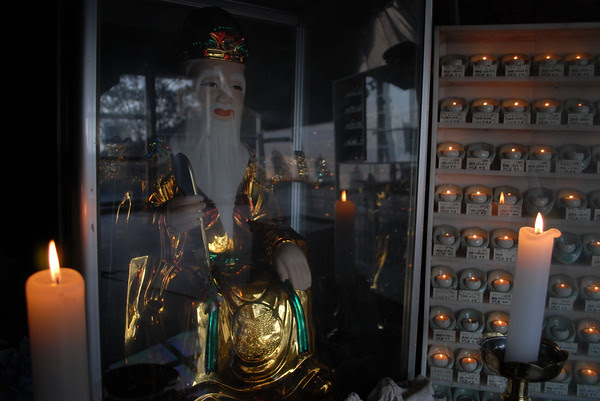 |
| Yong Wang, the Dragon King, beside a small spring in a cave at Seong Am Sa, Gyeongsan. |
Before coming to Korea, I'd read about Korea's active Shamanist tradition and was keen to try to immerse myself in it. I actually had little interest in Buddhism at all but was fascinated by global Shamanistic cultures. I even had fantasies about becoming one.
After a few months here, that interests dissipated. I began learning about Buddhism and became totally immersed. I spent most weekends traveling to mountain temples and slowly learning what I could manage to understand about it.
Initially, I sought out a few Shaman-related sites but felt no affinity for it. My first solo trip was to a shaman festival but the only thing I found interesting was a Javanese Gamelan performance. Learning about Buddhism felt like coming home, whereas Shamanism felt guarded and unwelcoming. As I learned more about contemporary Korean Shamans, they seemed more like business people and con-artists, charging thousands of dollars to perform ceremonies to expel negative energies from peoples lives. Eventually, it didn't interest me at all.
There are "authentic", traditional shamans who serve as mediums for ghosts and perform colourful, entranced dances, known as "g'ut", as part of their ceremony. I'm not sure how often exorcisms are still performed, but it was something a shaman would be solicited for. Intellectually, I still find these shamans extremely fascinating but on an intellectual level. As far as something to pursue, I had a strong inner sense that it was not for me to be involved with. Recently, though, through my continued understanding of Korean Buddhism, that old interest has been rekindled.
When Buddhism was first introduced to Korea, it succeeded by merging harmoniously with the Shamanistic spirit-worship that was present. This merge went both ways. In temples, especially mountain complexes, there is almost always one or more spirit shrine. The most common is for San Shin, the Mountain Spirit. Throughout my years of visiting temples, I often paid little attention to the Mountain Spirit shrines. I pretentiously believed it wasn't "real" Buddhism, a viewpoint I know regret, I usually ignored them. Occasionally, before a hike, I would enter a hall and do three bows out of respect. Mostly, I just enjoyed the Mountain Spirit imagery, especially when he was holding a ginseng root!
Then, a couple of weeks ago,
Professor David Mason, an expert on Korean mountains and traditional spirits, posted an image of the
Dragon King. I'd only heard once noticed coming across the Dragon king, and didn't realize that he was a prevalent character. Honestly, even in Buddhism, my interest was mostly limited to the historical Gotama Buddha and the Pali Suttas. The vast array of characters in temple paintings hadn't intrigued me. But something about David's post, the character of the painted image, fascinated me. I wanted to know more about him. I started getting up most mornings at 4:30 am so I could travel from one end of the province to the other searching for images of the Dragon King.
Aside from just his image (wouldn't he make a great superhero?), what really hit me, very deeply, was a reference I came across that broadened my understanding of Korea's ancient religion. Spirit worship was not merely about bowing and making offerings to an idol in a shrine as it seems to have been reduced to. It was to recognize the metaphorical Spirit that lives in the land, in the waters, that wisps through the air. To worship the Mountain Spirit or the Dragon King should be to take care of nature, to keep the balance in within it, to ensure that our way of life is sustainable.
It reminded me of the painful lack of this connection to the Earth that is now threatening existence. To think of how well this balance with nature was kept by spirit-worshiping cultures around the world makes me realize how advanced they were, how much they knew and understood. Despite our technology and complicated theories, we are certainly living in foolish times.